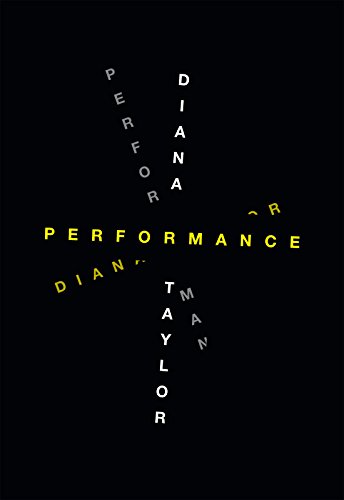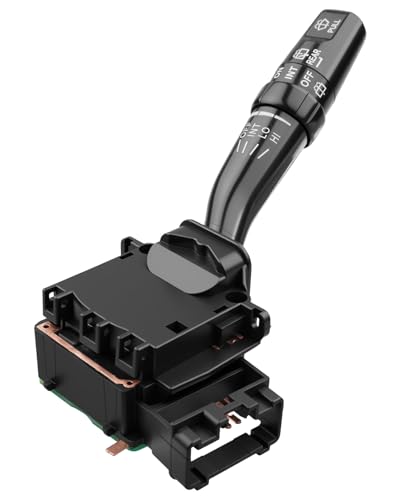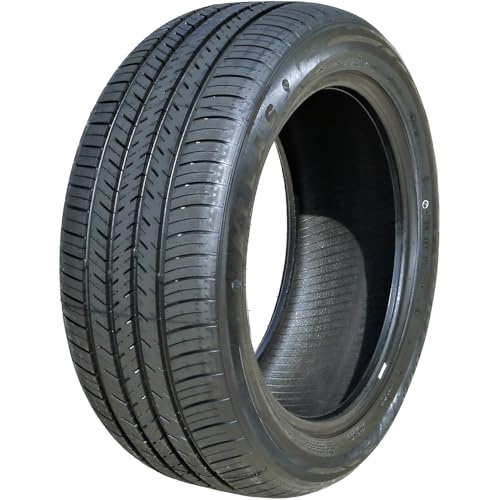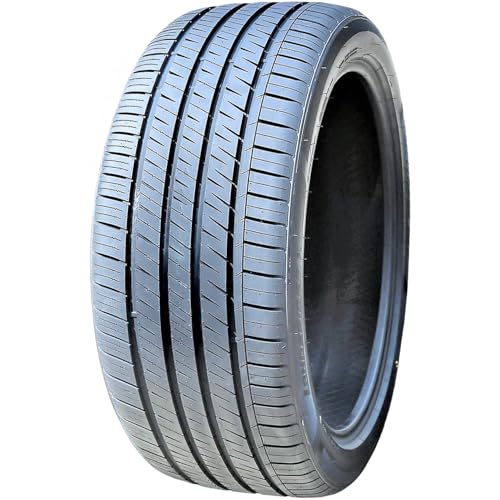There’s a moment every car owner dreads. It’s not the check engine light, but the slow, dawning realization during a routine service visit when the mechanic walks over, wiping greasy hands on a rag, and says, “You’re going to need new tires soon.” My moment came with my trusty daily driver, a sedan that had been faithfully shod with premium, big-name brand tires since it left the factory. The quote for a new set was eye-watering, nearly a quarter of the car’s current value. It sent me down a rabbit hole of research, seeking an alternative that wouldn’t break the bank but also wouldn’t compromise on the single most critical safety component of my vehicle. The market is flooded with budget-friendly options, but the question always looms: are you sacrificing safety and performance for savings? This is the exact dilemma that leads drivers to products like the Fullway HP108 All-Season Passenger Car Radial Tires, a tire that promises high-performance characteristics at a fraction of the cost. But does it deliver?
- Treadlife: N/A
- Tires Only
Decoding the Sidewall: What to Know Before Buying High-Performance All-Season Tires
A performance tire is more than just an item; it’s a key solution for enhancing your vehicle’s connection to the road. Unlike standard touring tires that prioritize comfort and longevity above all else, performance tires are engineered for superior grip, responsive steering, and stability at higher speeds. They often feature specialized tread compounds and patterns, like the asymmetrical design of the HP108, to maximize handling in both dry and wet conditions. The main benefit is a more engaging and confidence-inspiring driving experience, allowing for sharper turns, shorter braking distances, and a greater sense of control. For drivers who enjoy a spirited commute or simply want the added safety margin that better grip provides, a performance tire can transform the feel of their car.
The ideal customer for this type of product is someone facing the need for new tires on a daily driver—perhaps a sedan like a Nissan Altima or a Lexus ES350—who wants to upgrade from factory-installed touring tires without paying premium prices. They value responsive handling but are still budget-conscious. While it might not be suitable for those who live in areas with harsh winters requiring dedicated snow tires or for track-day enthusiasts who need the extreme grip of a summer-only ultra-high-performance tire. For those drivers, dedicated seasonal tires or higher-tier performance brands are a more appropriate, albeit more expensive, choice.
Before investing, consider these crucial points in detail:
- Tire Size & Fitment: This is non-negotiable. The size, such as 215/55R17, dictates the tire’s width (215mm), aspect ratio (the sidewall is 55% of the width), and the wheel diameter it fits (17 inches). Using the wrong size can negatively affect your car’s handling, speedometer accuracy, and safety systems. Always confirm your vehicle’s required tire size in your owner’s manual or on the driver’s side door jamb sticker.
- Capacity/Performance: Look beyond the size to the service description and UTQG rating. For the Fullway HP108, “98W” means a load index of 98 (1,653 lbs per tire) and a W speed rating (up to 168 mph). The UTQG of 380AA indicates a treadwear rating of 380 (lower is softer and wears faster), and the highest possible ratings for traction (A) and temperature resistance (A). These metrics tell you about the tire’s limits and potential lifespan.
- Materials & Durability: The tire’s tread compound and construction are paramount. The HP108 uses an asymmetrical tread pattern, which means the inner and outer portions of the tread are designed for different tasks—typically water evacuation on the inside and dry grip on the outside shoulder. While effective, the durability of budget tire compounds can be a concern, as a lower treadwear rating like 380 often suggests a shorter service life compared to premium tires rated at 500 or higher.
- Ease of Use & Maintenance: Tires require professional mounting and balancing, a cost to factor into your purchase. Once installed, their lifespan depends on proper maintenance. This includes regular rotation (every 5,000-7,000 miles), consistent monitoring of air pressure to the vehicle’s recommended PSI, and ensuring your vehicle’s alignment is correct. Neglecting these steps will cause premature and uneven wear on any tire, especially a performance model.
Keeping these factors in mind, the Fullway HP108 All-Season Passenger Car Radial Tires stands out in several areas, particularly its performance-oriented design at an entry-level price. You can explore its detailed specifications here.
While the Fullway HP108 All-Season Passenger Car Radial Tires is an excellent choice, it’s always wise to see how it stacks up against the competition. For a broader look at all the top models, we highly recommend checking out our complete, in-depth guide:
- Precise and Responsive Operation: Windshield wiper switch for accurate response with every switch. Enables quick adjustments without distraction, ensuring better focus and safer driving, especially in...
First Impressions and Key Features: A Closer Look at the HP108
Upon delivery, the first thing we noticed about the Fullway HP108 All-Season Passenger Car Radial Tires was their aggressive and modern-looking asymmetrical tread pattern. These don’t look like your typical bargain-bin tires. The deep, circumferential grooves for water evacuation are prominent, and the large, solid shoulder blocks hint at their cornering aspirations. The Black Side Wall (BSW) is clean and understated, giving the tire a classic performance look. The rubber compound felt pliable but firm to the touch, consistent with an all-season performance design. There were no visible blemishes or molding imperfections on our set. Compared to the well-worn premium tires they were replacing, the tread depth of 10.1mm was substantial and promised a good start. The overall impression is that of a tire punching above its weight class in terms of aesthetics and initial build quality, making us eager to get them mounted and put them to the test on the road.
Key Benefits
- Excellent value for a high-performance design
- Asymmetrical tread provides confident dry and wet handling
- Surprisingly quiet and smooth ride for a performance tire
- Extra Load (XL) rating offers stiffer sidewalls for better response
Limitations
- Low UTQG treadwear rating (380) suggests a shorter lifespan
- Reports of potential manufacturing defects and premature failure
Deep Dive: Putting the Fullway HP108 Through Its Paces
A tire’s true character is only revealed on the pavement. We mounted our set of Fullway HP108 All-Season Passenger Car Radial Tires on a 2011 Honda Accord V6, a perfect candidate that can benefit from a more performance-oriented tire. After professional mounting and balancing, we spent several weeks evaluating them across a spectrum of driving conditions, from mundane city commuting to spirited backroad drives and highway cruising in both sun and rain.
Dry Handling and Cornering Stability
This is where the Fullway HP108 truly surprised us. The steering response was immediately sharper and more direct than the old touring tires. The Extra Load (XL) construction results in a stiffer sidewall, which significantly reduces the vague, mushy feeling often present when initiating a turn. On winding roads, the tires felt planted and predictable. The large outer shoulder blocks of the asymmetrical tread dug in and held their line with confidence, allowing us to carry more speed through corners than we thought possible on a budget tire. One user who mounted them on a 2007 Lexus ES350 noted they “changed the feel of the ride completely,” and we can absolutely corroborate this sentiment. It’s a transformative upgrade for any standard passenger car. Braking performance was equally impressive on dry tarmac; the tires gripped well under hard deceleration with no noticeable drama. While they don’t offer the razor-sharp feedback of a premium ultra-high-performance tire, for daily driving and spirited commuting, they deliver a level of performance that far exceeds their price tag.
Wet Weather and All-Season Capability
The “All-Season” designation on any tire should be taken with a grain of salt, especially on performance-focused models. We found the HP108 to be a very capable three-season tire. During moderate to heavy rainfall, the four wide circumferential grooves did an excellent job of channeling water away from the contact patch. On the highway, the tires resisted hydroplaning admirably at legal speeds, providing a secure and stable feeling that inspires confidence in wet conditions. One user mentioned they “handle well in all conditions,” and in our wet-weather testing, they certainly held their own. However, it’s crucial to set realistic expectations. This is not a tire for snow or ice. The tread compound is not designed for freezing temperatures, and the lack of heavy siping means it would offer very poor traction in wintery conditions. For drivers in climates with real winters, a dedicated snow tire is the only safe option. But for regions with hot summers and rainy shoulder seasons, the HP108 is a reliable performer.
Ride Comfort, Noise, and Road Feel
Often, a “performance” tire means sacrificing comfort and quietness for grip. We were braced for a harsh, noisy ride, but were once again pleasantly surprised. The Fullway HP108 All-Season Passenger Car Radial Tires deliver a remarkably smooth and quiet ride. On the highway, there was no intrusive tread hum or drone, just a faint and easily ignored whir. They absorbed minor road imperfections and expansion joints without transmitting harsh impacts into the cabin. This balance of sharp handling and comfortable cruising is a significant achievement for a tire in this price bracket. One of the most common points of praise from users is how quiet and smooth they are, with one driver who put them on several cars confirming this finding. This makes the HP108 an excellent choice for those who want to add a bit of sportiness to their daily commute without the punishing ride quality that often comes with it. If you’re looking to upgrade your car’s feel without sacrificing daily livability, these tires present a compelling case.
The Longevity Question: Treadwear and Durability Concerns
This is the elephant in the room and the single biggest trade-off with the Fullway HP108. The UTQG rating of 380AA is the primary indicator. The “380” treadwear number is relatively low. For comparison, many premium all-season touring tires are rated between 600 and 800. This suggests a softer, stickier rubber compound that, while great for grip, will inherently wear out faster. This concern is heavily supported by user feedback. One driver, despite meticulous care, proper inflation, and good alignment, reported their tires were worn out after just 20,000 miles. Another astutely pointed out that they “wouldn’t recommend anything less than 500” for treadwear. This is the price you pay for affordable performance. Furthermore, there are isolated but serious reports of catastrophic failure, with one user experiencing a blowout on the highway just hours after installation. While this could be a one-off defect, it highlights a potential risk in quality control that is more prevalent in budget brands. Buyers must weigh the excellent initial performance and low cost against the high probability of replacing them much sooner than a premium tire.
What Other Users Are Saying
Across the board, the feedback on the Fullway HP108 All-Season Passenger Car Radial Tires paints a very clear picture of a product with distinct highs and lows. The positive sentiment is almost entirely centered on value and performance-for-price. Users are frequently “well worth the money,” and praise them as being as “good as any big name tire” when it comes to ride quality, noise level, and handling. For many, finding their specific tire size at such a low price was a huge victory.
However, the negative feedback is equally consistent and focuses on a critical flaw: durability. The most damning report comes from a user who stated, “They didn’t last as long as they should have,” getting only 20,000 miles despite proper care. This is a significant concern for anyone calculating long-term cost. Even more alarming is the account of a tire popping on the highway shortly after being installed, raising serious questions about quality control and safety. These reports serve as a crucial reality check, confirming our own analysis that the low treadwear rating is not just a number on the sidewall but a real-world indicator of a shorter lifespan.
How the Fullway HP108 Stacks Up Against the Competition
No product exists in a vacuum. To understand the Fullway HP108’s place in the market, it’s essential to compare it to other popular budget-friendly options. Each alternative serves a slightly different driver or vehicle, highlighting the specific niche the HP108 aims to fill.
1. Lexani LXTR-203 Passenger Tire
- Budget-friendly price but doesn't compromise on value
- Optimized pitch sequence which reduces noise so you can enjoy driving in peace
The Lexani LXTR-203 is a direct competitor in the budget tire space but leans more towards the grand touring category rather than high performance. It prioritizes a comfortable, quiet ride and a longer tread life over the sharp handling of the Fullway HP108. A driver who values predictable, all-season traction for straightforward commuting and is willing to trade some steering responsiveness for potentially more miles per dollar might prefer the Lexani. In contrast, the Fullway HP108 is for the driver who wants to feel more connected to the road and is willing to accept the trade-off of a shorter lifespan to get that enhanced performance feel.
2. Atlas Force UHP 255/50R19 107Y XL Passenger Tire
- Dual-zone tread pattern with wet-weather traction pattern at center and dry-weather design at edges allows for consistent performance in wet and dry conditions
- 3D sipes enhance wet-weather traction, steering response and braking performance
The Atlas Force UHP represents a step up in performance focus, as indicated by its “UHP” (Ultra High Performance) designation. This tire is designed for drivers of sportier sedans or coupes who demand even more aggressive dry and wet grip than the Fullway HP108 provides. It will likely feature an even softer tread compound and a pattern optimized for maximum traction, often at the expense of ride comfort and tread life. A driver who prioritizes carving corners and spirited driving above all else would be better served by the Atlas Force UHP. The Fullway HP108 serves as a more balanced middle ground, offering a taste of performance without fully sacrificing daily-driver comfort.
3. Landspider Citytraxx H/P All-Season Truck/SUV Tire
This comparison highlights the importance of vehicle type. The Landspider Citytraxx H/P is engineered specifically for the higher weight and different handling dynamics of trucks and SUVs. While it also carries a “High Performance” (H/P) all-season rating, its internal construction, load capacity, and tread design are fundamentally different from a passenger car tire like the Fullway HP108. Putting a passenger tire on an SUV is unsafe, and vice-versa. This alternative is for a completely different customer, but it demonstrates that the principles of balancing performance, comfort, and longevity apply across all vehicle categories.
Final Verdict: Are the Fullway HP108 Tires the Right Choice for Your Car?
After extensive testing and analysis, our verdict on the Fullway HP108 All-Season Passenger Car Radial Tires is clear: it is a tire of calculated compromises. It brilliantly succeeds in delivering a high-performance driving feel—sharp steering, confident grip, and a quiet ride—at a price point that is almost impossible to ignore. For the budget-conscious driver of a standard sedan or coupe looking for an immediate and dramatic improvement in handling, it’s a phenomenal value proposition.
However, this value comes with a significant caveat: longevity. With a low 380 treadwear rating and user reports confirming a short lifespan, this is not a “buy it and forget it” tire. It’s a short-term solution for those who prioritize immediate performance over long-term cost-effectiveness. We would recommend the HP108 to someone needing to replace worn-out tires on an older vehicle to pass inspection, or for a driver who covers low annual mileage and wants to enjoy a sportier feel without a large upfront investment. If durability and peace of mind are your top priorities, you would be better served by investing more in a tire with a higher treadwear rating from a more established brand.
If you’ve decided the Fullway HP108 All-Season Passenger Car Radial Tires is the right fit for your needs and budget, you can check its current price and purchase it here.
Last update on 2025-11-05 / Affiliate links / Images from Amazon Product Advertising API


![Performance (The Criterion Collection) [Blu-ray]](https://m.media-amazon.com/images/I/41fnOVHHSrL.jpg)




